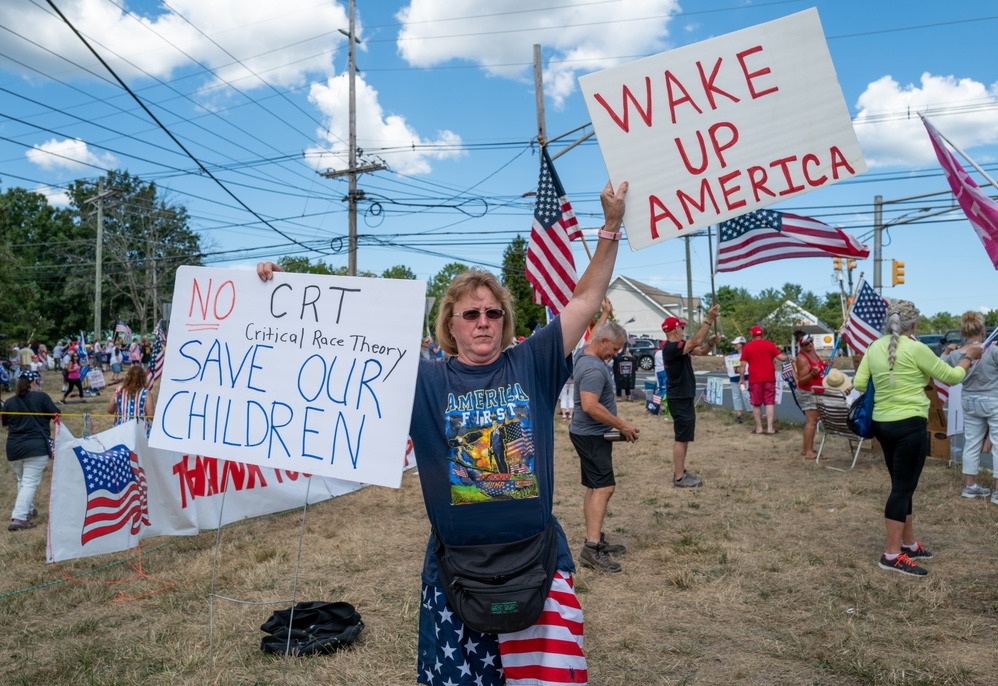In 2021, there was a sudden shift in how school board meetings around the country were conducted: Routine meetings turned heated, with angry community members often accusing educators of teaching their kids about critical race theory without their knowledge. That led to a firestorm of anti-CRT (Critical Race Theory) bans, intense focus on school board elections and partisan divides within local communities on education.
A new peer-reviewed study by researchers at Michigan State University and the University at Albany provides some insight into how the anti-CRT movement took hold — and the lasting consequences for how communities view their teachers and schools.
“We’ve seen debates about curriculum before but nothing that was so nationalized and spread like this,” said Ariell Bertrand, a doctoral student at MSU and one of the study’s authors.
The study examined the narratives that policymakers were using to justify CRT bans in the first 29 states that proposed them, she said. Based on the “narrative policy framework,” which scholars use to determine how policymakers and lobbyists use narrative storytelling to influence legislation, the researchers identified 11 key anti-CRT “narrative plots” being circulated.
People’s level of exposure to 11 anti-CRT ‘plots’ shaped their perceptions of their community’s schools
According to the study, conservative think tanks such as the Manhattan Institute and Heritage Foundation and the group Moms for Liberty drafted specific narratives that brought CRT into the mainstream. The Manhattan Institute’s Christopher Rufo, who is considered a key architect of the anti-CRT movement, tweeted his intention in 2021 to redefine CRT “to annex the entire range of cultural constructions that are unpopular with Americans.”
“… these narratives were having this downstream effect on people’s likelihood to even trust their local schools anymore.”
Ariell Bertrand, one of the study’s authors
The study found that the narratives created by these groups — the most common being that CRT indoctrinates children in school to feel guilty about their race — quickly took hold, Bertrand said. According to the study, since 2021, 44 states have introduced more than 140 anti-CRT laws or bans related to concepts allegedly being taught in K-12.
In addition, a survey the researchers conducted of Michigan adults in fall 2021 found that individuals who reported hearing any of the anti-CRT narratives were less likely to trust their local teachers to teach any subject fairly. People who had heard all 11 narrative plots were 59 percent more likely to support a CRT ban than individuals who had not been exposed to the ban-CRT narratives.
In surveys, Americans typically express strong support for their local teachers and schools even if they don’t hold favorable views about the nation’s public schools as a whole, Bertrand noted. But this survey challenges that pattern, showing that the anti-CRT narratives began to unravel support even for the schools and teachers people knew best, she said. The survey also found that adults who’d been exposed to the anti-CRT narratives didn’t trust teachers to discuss race or racism or choose materials to supplement curricula, and overall were less likely to support instruction on fairness and equity, she said.
[Related: North Carolina House passes bill limiting racial teachings]
“In the United States we have these really strong macro-level beliefs about public education, such as this belief that education is this cornerstone to our democracy,” Bertrand said. “We found that these narratives were having this downstream effect on people’s likelihood to even trust their local schools anymore.”
Attention has shifted from anti-CRT legislation to LGBTQ student rights and banning books.
The findings also point to partisan and racial divides. Republicans and white adults were more likely to embrace CRT narratives. For example, while a Democrat who had heard all the CRT plots had a 44 percent probability of supporting a CRT ban, someone who identified as Republican had an 88 percent probability. White individuals who’d heard all the CRT plots had a 73 percent chance of supporting a CRT ban, compared to 46 percent for Black individuals.
Now, as attention shifts from anti-CRT legislation to LGBTQ student rights and banning books, Bertrand said she and colleagues believe these narratives and attacks on public education will have similar repercussions. “For generations to come these narratives could undermine people’s support for public education and funding and things like that,” she said.
The CRT study is part of a broader research project led by coauthor Rebecca Jacobsen, professor of education policy at MSU, that looks at how school board meetings have changed since 2019 as a result of anti-CRT, anti-LGBTQ+ and other national narratives.
The researchers are finding that even in places where school board candidates weren’t necessarily running on these issues, school boards made changes to how meetings are run — for example, by limiting open comment periods, adding timers counting down how long speakers may talk, and enhancing security. While these changes are a way to control heated meetings, Jacobsen said they have the long-term effect of altering how the public interacts with its schools.
“This was really an up-close-and-personal opportunity to shape politics, especially around an issue that’s so important to many people: education and the future of their children,” she said of school board meetings. “What was a well-intentioned response has potentially further distanced people and only maybe fueled some of these claims, like ‘Look, our schools are not about you or your children. Look, these people are not listening.’”
Today, the people showing up to meetings include not just parents and families who have legitimate concerns and complaints about how they want their children to be taught, she said, but community members and outsiders who are sharing misinformation about what is happening in schools. While public education is far from perfect, she said, most Americans have shared a universal commitment to supporting education.
But as partisan divides deepen around the issue, she said, “I really think that that’s beginning to wane.”
***
Javeria Salman is a Hechinger Report staff writer and writes the Future of Learning newsletter. She covers K-12 education issues through the lens of innovation and technology. Her work has appeared in Telemundo, The Atlanta-Journal Constitution, The Christian Science Monitor and the Solutions Journalism Network.
This story about CRT was produced by The Hechinger Report, a nonprofit, independent news organization focused on inequality and innovation in education. Sign up for the Hechinger newsletter.




























